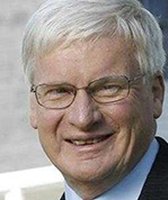Stand up for the facts!
Our only agenda is to publish the truth so you can be an informed participant in democracy.
We need your help.
I would like to contribute

In this Feb. 24, 2015 photo, U.S. Customs and Border Protection Air and Marine agents patrol along the Rio Grande on the Texas-Mexico border near Rio Grande City, Texas. AP Photo
Confusion was king after commentators portrayed Gov. Scott Walker’s recent remarks on illegal immigration as a "mess" or a "flip flop" or a "self -created political predicament."
Walker denied he had shifted positions on the issue. Media reports contradicted each other -- and parsed his position based on second-hand reports from a private meeting with Republicans at a New Hampshire restaurant.
Now that a week has passed, what do we know for sure about the views of Walker, a 2016 presidential hopeful?
Let’s put Walker’s remarks In Context, a periodic feature that allows us to examine statements that have generated controversy confusion.
While initial reports suggested Walker had moved left on the issue, his subsequent clarifications point the other direction.
Sort of.
At the same time, Walker appears to be holding back just enough detail to give himself room to embrace some form of immigration reform if elected.
Maybe.
Let’s review.
In February, Walker began edging away from previous support for a path to citizenship for the estimated 11 million immigrants who came to the United States illegally, circumventing the waiting periods in the legal immigration system. We gave him a Half Flip for his shifting views.
In March, he said he’d "absolutely" changed his mind, and that after talking to border-state governors he backed off his support for such a path. That earned him a Full Flop on our Flip-O-Meter.
The reversal also earned Walker extra media scrutiny -- especially after the March 13, 2015 closed-door dinner in New Hampshire.
Citing three sources who were at the event, the Wall Street Journal reported Walker had backed a path to citizenship for those here illegally. That could have amounted to, well, a Full-Flop-Flip.
Team Walker immediately pushed back, saying the governor "does not support citizenship for illegal immigrants."
But even if Walker didn’t change his views on citizenship, is it possible he supported a pathway to legal residency status for those already here illegally? (As Milwaukee County executive in 2002, Walker signed a resolution favoring legal status).
That’s what the GOP organizer of the New Hampshire event told The New York Times -- that Walker had stated support for a pathway to legal status for undocumented immigrants.
Such a position would amount to "amnesty" in the eyes of some conservatives.
So we listened with interest to Walker’s March 2015 comments in Texas.
Here is a look at what he said to reporters in Harris County, Texas, based on a March 29, 2015 posting on the Washington Post website:
"If someone wants to have citizenship they ultimately need to go to the country of origin and then get in line just like anybody else would. There’s benefits when it comes to voting, and other benefits that come with that. In terms of things beyond that, that’s again where we gotta tackle these other issues first and then have a president who’s willing to work with the Congress to figure out a reasonable way going forward..."
Walker said doesn’t believe in amnesty "in the sense of citizenship."
"I believe if someone wants to be a legal citizen of the United States, there is a legal path by which to do that going forward. I think we need to address the issues with the border, the security of the border for the safety reasons we mentioned. We need to re-establish the fact that this president has overstepped his bounds..."
So Walker clearly rules out granting citizenship to those here illegally, unless they want to return home and wait to get back in.
Nowhere in those comments does Walker directly address giving legal status for those here illegally. But he did not rule it out, and talks about finding a "reasonable" way going forward.
Walker has previously said he doesn’t want to deport those living here illegally.
So his Texas comments appear to add a few details, in that he advocates people leaving the country on their own in order to get right with the immigration laws before returning.
Criticism from both sides
How did the two sides in the debate view Walker’s latest comments?
The Federation for American Immigration Reform (FAIR), a leading critic of legalizing the status of people who jumped the line to get in, said Walker is being somewhat naive or disingenuous.
"He needs to be honest," said spokesman Ira Mehlman. "For many people, there is no line to get into, nor can there be. There are 7 billion people on this planet who are not citizens of the United States. It is simply not possible to provide everyone a legal avenue to immigrate."
Mehlman said he needs more details to pass final judgment on whether Walker is advocating "amnesty" in FAIR’s view.
Meanwhile, an advocate with America’s Voice, a group that backs a path to citizenship, said Walker appeared to be offering neither a path to citizenship nor a path to legal status.
"The only pathway he’s offering is to return to your country of origin, and hope that you can get a visa or a green card from there," said Lynn Tramonte, deputy director of the group. "He’s not addressing the parts of the law that prevent people from getting papers in the first place."
Tramonte said Walker’s voluntary departure language echoes the "report to deport" concept that has popped up in recent years, most notably by U.S. Sen. John Cornyn (R-TX) and former Sen. Jon Kyl (R-AZ) a decade ago.
It’s related to "the self-deportation" idea from 2012 Republican presidential nominee Mitt Romney, Tramonte said -- though Walker reportedly mocked Romney’s concept at the New Hampshire event.
"Candidates are tying themselves in knots trying to appeal to both the hardline anti-immigrant voters overrepresented in Republican primary season, while hoping to avoid the Romney mistakes of having anti-immigrant primary stances destroy their competitiveness with Latino, Asian-American, and other pro-reform voters in the general election," an America’s Voice blog post said.
Our Sources
Washington Post, video of Walker remarks, March 29, 2015
Emails with Ira Mehlman, FAIR, March 31, 2015
Emails with Lynn Tramonte, America’s Voice, March 31, 2015
Flip-O-Meter item, Feb. 4, 2015
Flip-O-Meter item, March 6, 2015
Wall Street Journal, March 26, 2015
New York Times, March 26, 2015















































